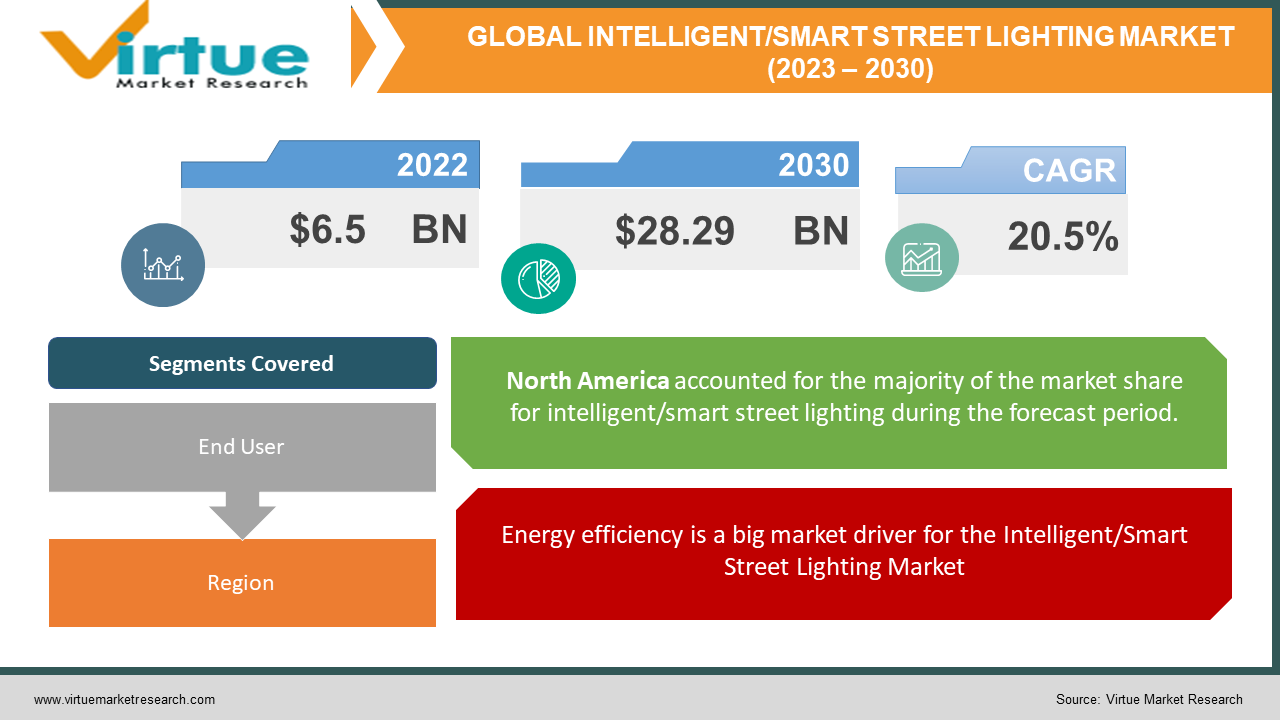Global Intelligent/Smart Street Lighting Market Size (2023 – 2030)
In 2022, the global Intelligent/Smart Street Lighting market size was valued at USD 6.5 billion and is projected to reach a market size of USD 28.29 billion by 2030, and it is projected to expand at a compound annual growth rate (CAGR) of around 20.5% during the forecast period.

The increasing demand for energy-efficient lighting systems, the growing adoption of Internet of Things (IoT) technology in the lighting industry, and the increasing focus on smart cities are some of the major factors driving the growth of the market. The Intelligent/Smart Street Lighting market refers to the industry that deals with the production, distribution, and use of smart street lighting systems. These systems are designed to optimize energy efficiency, reduce costs, and enhance public safety. They are equipped with sensors, controllers, and software that allow them to adjust their brightness levels, turn on and off automatically, and communicate with central management systems.
Market Overview
Intelligent/Smart Street Lighting Market Drivers
-
Energy efficiency is a big market driver for the Intelligent/Smart Street Lighting Market: Smart Street lighting systems use advanced technology to optimize energy consumption and reduce costs. This is particularly important as cities and municipalities look to reduce their carbon footprint and meet sustainability goals.
-
Government initiatives are another market driver for the Intelligent/Smart Street Lighting Market: Governments around the world are investing in smart city projects, which include the deployment of intelligent street lighting systems. This is being driven by the need to improve public safety, reduce crime, and increase energy efficiency.
-
Public safety and security are also a driver for the Intelligent/Smart Street Lighting Market: Smart Street lighting systems can be equipped with cameras, sensors, and other security features to enhance public safety and deter crime. This is becoming increasingly important as cities become more densely populated and crime rates rise.
-
Advancements in technology are a big market driver for the Intelligent/Smart Street Lighting Market: Advancements in LED lighting technology, IoT and AI are driving the growth of the smart street lighting market. This technology allows for remote monitoring, control, and maintenance of street lighting systems, which can lead to significant cost savings for cities and municipalities.
-
Growing awareness is another major driver for the Intelligent/Smart Street Lighting Market: With the increasing awareness about the benefits of smart city infrastructure, the demand for smart street lighting is also increasing. This includes benefits such as energy efficiency, cost savings, improved public safety, and reduced crime.
Intelligent/Smart Street Lighting Market Challenges –
-
High cost of installation is a big challenge for the Intelligent/Smart Street Lighting Market: The cost of installing intelligent street lighting systems can be high, which can be a barrier for some cities and municipalities. This is particularly true for smaller communities that may not have the financial resources to invest in these systems.
-
Complexity of systems is another big challenge for the Intelligent/Smart Street Lighting Market: The integration of multiple technologies and systems can make intelligent street lighting systems complex to install, operate and maintain. This can be a challenge for cities and municipalities that may not have the necessary technical expertise to manage these systems.
Intelligent/Smart Street Lighting Market Opportunities –
-
Increasing adoption in developing countries: Developing countries are increasingly investing in smart city infrastructure, including intelligent street lighting systems. This presents an opportunity for companies operating in the market to expand into new geographic regions.
-
Public-private partnerships: The deployment of intelligent street lighting systems often requires significant investment. Public-private partnerships (PPP) can be a viable solution to this problem, as they allow cities and municipalities to leverage private sector expertise and funding to implement these systems.
-
Retrofitting: Many cities and municipalities have existing street lighting infrastructure that is in need of upgrading. The retrofitting of existing lighting systems with intelligent technology presents an opportunity for companies in the market to upgrade existing infrastructure and reduce costs.
Impact of Covid-19 on the Intelligent/Smart Street Lighting Market –
The COVID-19 pandemic has had a significant impact on the intelligent/smart street lighting market. The economic downturn caused by the pandemic has led to reduced demand for smart street lighting systems as cities and municipalities have less funding available for infrastructure projects. Many smart street lighting projects have been delayed or put on hold due to budget constraints and supply chain disruptions caused by the pandemic. The pandemic has caused disruptions to global supply chains, leading to delays and increased costs for the production of smart street lighting systems. However, the pandemic has also accelerated the trend towards remote work, which has led to a decrease in traffic, and therefore, reduced energy consumption in street lighting. Additionally, the pandemic has increased the focus on public safety and governments are looking for ways to improve security in public spaces, this has led to an increased interest in smart street lighting systems that can be equipped with cameras and other security features.
Intelligent/Smart Street Lighting Market Recent Developments –
-
In 2021, Honeywell International Inc. announced its acquisition of Elster Solutions, a leading provider of smart metering and grid management solutions. The acquisition will enhance Honeywell's capabilities in the smart street lighting market.
-
In 2020, GE Lighting, a division of General Electric, announced its merger with Savant Systems, a provider of smart home automation technology. The merger will expand GE Lighting's offerings in the smart street lighting market by integrating Savant's technology into GE's street lighting systems.
-
In 2020, Acuity Brands Inc. announced its acquisition of Distech Controls, a leading provider of building automation and energy management solutions. The acquisition will enhance Acuity's capabilities in the smart street lighting market by integrating Distech's technology into Acuity's lighting systems.
INTELLIGENT/SMART STREET LIGHTING MARKET REPORT COVERAGE:
|
REPORT METRIC |
DETAILS |
|
Market Size Available |
2022 - 2030 |
|
Base Year |
2022 |
|
Forecast Period |
2023 - 2030 |
|
CAGR |
20.5% |
|
Segments Covered |
By End User, and Region |
|
Various Analyses Covered |
Global, Regional & Country Level Analysis, Segment-Level Analysis, DROC, PESTLE Analysis, Porter’s Five Forces Analysis, Competitive Landscape, Analyst Overview on Investment Opportunities |
|
Regional Scope |
North America, Europe, APAC, Latin America, Middle East & Africa |
|
Key Companies Profiled |
Sensus, Silver Spring Networks, Telensa Legrand S.A, Zumtobel Group AG, Schneider Electric, Honeywell International Inc., Wipro Limited, Philips Lighting, GE Lighting, Osram |
Intelligent/Smart Street Lighting Market Segmentation
Intelligent/Smart Street Lighting Market By End-user:
-
Government
-
Commercial
-
Residential and others
Among these end-users, the Commercial segment stands out as the largest. Businesses and commercial establishments leverage Intelligent/Smart Street Lighting to enhance visibility, improve security, and create inviting and safe environments for customers and employees. The Commercial segment's prominence is fueled by the need for well-lit and welcoming spaces in shopping malls, parking lots, industrial areas, and commercial districts. The adoption of energy-efficient and smart lighting solutions in commercial spaces drives the growth of this segment.
Looking ahead, the Residential segment is projected to be the fastest growing during the forecast period. With the growing trend of smart homes and the increasing awareness of energy conservation, residential areas are embracing Intelligent/Smart Street Lighting. Homeowners seek smart lighting systems that offer automation, remote control, and energy savings. As more cities integrate Intelligent/Smart Street Lighting in residential neighborhoods, the Residential segment is set to witness significant growth, reflecting the rising demand for smart and connected living spaces.
By Region:
-
North America
-
Europe
-
Asia Pacific
-
Middle East
-
Latin America
North America is to hold the largest share of the market due to the presence of key players in the region, and the increasing adoption of advanced technologies such as IoT, AI and 5G in the region. Europe is also anticipated to hold a significant share of the market due to the increasing government initiatives to adopt smart city infrastructure and the increasing awareness about the benefits of energy-efficient lighting systems. The Asia Pacific region is anticipated to witness a high growth rate due to the increasing urbanization and the increasing adoption of smart city infrastructure in the region. South America and the Middle East and Africa are anticipated to witness moderate growth due to the increasing government initiatives to adopt smart city infrastructure and the increasing awareness about the benefits of energy-efficient lighting systems in these regions.
Intelligent/Smart Street Lighting Market Key Players
-
Sensus
-
Silver Spring Networks
-
Telensa
-
Legrand S.A
-
Zumtobel Group AG
-
Schneider Electric
-
Honeywell International Inc.
-
Wipro Limited
-
Philips Lighting
-
GE Lighting
-
Osram
Chapter 1. INTELLIGENT/SMART STREET LIGHTING MARKET – Scope & Methodology
1.1. Market Segmentation
1.2. Assumptions
1.3. Research Methodology
1.4. Primary Sources
1.5. Secondary Sources
Chapter 2. INTELLIGENT/SMART STREET LIGHTING MARKET – Executive Summary
2.1. Market Size & Forecast – (2023 – 2030) ($M/$Bn)
2.2. Key Trends & Insights
2.3. COVID-19 Impact Analysis
2.3.1. Impact during 2023 - 2030
2.3.2. Impact on Supply – Demand
Chapter 3. INTELLIGENT/SMART STREET LIGHTING MARKET – Competition Scenario
3.1. Market Share Analysis
3.2. Product Benchmarking
3.3. Competitive Strategy & Development Scenario
3.4. Competitive Pricing Analysis
3.5. Supplier - Distributor Analysis
Chapter 4. INTELLIGENT/SMART STREET LIGHTING MARKET - Entry Scenario
4.1. Case Studies – Start-up/Thriving Companies
4.2. Regulatory Scenario - By Region
4.3 Customer Analysis
4.4. Porter's Five Force Model
4.4.1. Bargaining Power of Suppliers
4.4.2. Bargaining Powers of Customers
4.4.3. Threat of New Entrants
4.4.4. Rivalry among Existing Players
4.4.5. Threat of Substitutes
Chapter 5. INTELLIGENT/SMART STREET LIGHTING MARKET - Landscape
5.1. Value Chain Analysis – Key Stakeholders Impact Analysis
5.2. Market Drivers
5.3. Market Restraints/Challenges
5.4. Market Opportunities
Chapter 6. INTELLIGENT/SMART STREET LIGHTING MARKET – By End User
6.1. Government
6.2. Commercial
6.3. Residential and Others
Chapter 7. INTELLIGENT/SMART STREET LIGHTING MARKET – By Region
7.1. North America
7.2. Europe
7.3. Asia - Pacific
7.4. Middle East
7.5. Latin America
Chapter 8. INTELLIGENT/SMART STREET LIGHTING MARKET – By Companies
8.1. Sensus
8.2. Silver Spring Networks
8.3. Telensa
8.4. Legrand S.A
8.5. Zumtobel Group AG
8.6. Schneider Electric
8.7. Honeywell International Inc.
8.8. Wipro Limited
8.9. Philips Lighting
8.10. GE Lighting
8.11. Osram
Download Sample
Choose License Type
2500
4250
5250
6900
Frequently Asked Questions
The intelligent/smart street lighting market refers to the use of advanced technology in street lighting systems to improve energy efficiency, reduce costs, and enhance overall functionality. These systems typically include sensors, wireless communication devices, and control systems that allow for remote monitoring and management of the lights.
The key drivers of the intelligent/smart street lighting market include energy efficiency, government initiatives, public safety and security, advancements in technology, and growing awareness about the benefits of smart city infrastructure.
The challenges facing the intelligent/smart street lighting market include high cost of installation, complexity of systems, privacy concerns, interoperability issues, and cybersecurity.
The opportunities in the intelligent/smart street lighting market include increasing adoption in developing countries, development of new technologies, government funding, public-private partnerships, and retrofitting of existing lighting systems.
The COVID-19 pandemic has had a mixed impact on the intelligent/smart street lighting market. On one hand, it has led to reduced demand and project delays due to budget constraints and supply chain disruptions. On the other hand, it has accelerated the trend towards remote work and increased the focus on public safety, which has led to an increased interest in smart street lighting systems.



